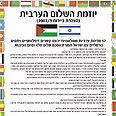

The Geneva Initiative, also known as the Geneva Accord, was signed in 2003 as means of putting in place a framework which will eventually lead to a comprehensive peace agreement between Israel and the Palestinian Authority. The accord was signed in December 2003, in Geneva, Switzerland, by unofficial Israeli and Palestinian delegates.
Throughout 2002 and 2003 prominent Israeli and Palestinian officials embarked on mutual negotiations aimed at findings a pragmatic way that would allow Israel and the Palestinian Authority to strike a permanent peace agreement.
Heading the Israeli team were former Meretz Head Yossi Beilin, former IDF Chief of Staff Amnon Lipkin-Shahak, then-Labor Knesset members Amram Mitzna and Avraham Burg, Brigadier- General (Res.) Gideon Shefer, police Commander Elik Ron and the Likud's Nehama Ronen. Members of the Palestinian side included PA minister Yasser Abd Rabbo and Palestinian Legislative Council members Kadura Fares and Hisham Abdel-Razek. Former US President Jimmy Carter was one of the initiative's patrons, as was former South African President Nelson Mandela.

Pro-Geneva initiative rally (archive: Gil Yohanan)
The initiative's statement begins with a joint declaration by Israel and the Palestine Liberation Organization (PLO) reaffirming their desire to end the decades-long conflict between them and their wish to coexist peacefully and reach an historic agreement. The statement also says that the accord was based on UN resolutions 242 and 338 and the two-state solution.
The initiative stated as follows:
- The accord will end the Israeli-Palestinian conflict and settle all claims which predate it, on both sides. Israel acknowledges Palestine as the Palestinian's national homeland; and the Palestinians acknowledge the Jewish people's right to its homeland.
- Israel and Palestine pledge to recognize each other's right to a peaceful existence within in determined borders; free of the threat of war, terror and violence. Both sides will refrain from aiding any military coalition against one another and will prevent the formation of any militia groups within their respective territories. Existing militant groups will be disarmed and dissolved and neither side will aid or support violence against its neighbor. Palestine will be a non-military state with a wide-scale security force. Said security forces will be the only group allowed to carry weapons.
- The border between Israel and Palestine will be set according to UN resolutions 242 and 338 and will be final. Israel will be responsible for the relocation of any Israelis residing in the West Bank (i.e. in settlements); but nevertheless, Israel's borders will include Jewish communities outside the Green Line and the Jewish neighborhoods of east Jerusalem, as well as several areas which carry security significance. Israel will allot the Palestinians respective areas in exchange for the annexation of settlements and areas in east Jerusalem.
- Jerusalem: The parties' mutually-recognized capitals will be in the areas of Jerusalem under their respective control. The Old City will be open to all and all Israelis will have free access to Temple Mount. Temple Mount and its mosques will be under Palestinian sovereignty. The Western Wall will be under Israeli sovereignty. The Arab citizens of east Jerusalem will become citizens of Palestine, effectively renouncing their permanent Israeli residency status.
- The accord will instate a full, comprehensive and final solution to the issue of refugees and will settle all claims on the matter. The refugees' only automatic right will be to reside in Palestine. The final settlement will include an element of monetary compensation and permanent housing. Refugees will have a choice between remaining in their current place of residence of relocating to one of the countries which have expressed their desire to take in Palestinian refugees.
- All of the Palestinian and Arab prisoners jailed due to the Israeli-Palestinian conflict will be released gradually.
- A multinational monitors group led by the United States will be formed in order to oversee the implementation of this agreement. An armed multinational force will deploy throughout Palestine and a foreign policing force will monitor Palestine's border cross points with other Arab nations.
The Geneva initiative came under heavy criticism by both the Israeli and the Palestinian publics. The vast waivers it required of Israel were censured by the political Right and many in the Israeli religious establishment; while Palestinian rights groups, as well as Hamas and Islamic Jihad, slammed it for making too many concessions regarding the Palestinian's right of return.
Ariel Sharon's government eventually rejected the initiative altogether, while the Labor Party, serving on the opposition at the time, neither endorsed nor rejected it.














